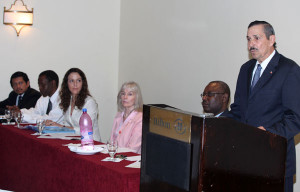
Nassau, Bahamas – Workshops to modernise sanitary and phytosanitary legislation opened in Nassau on Monday.
The purpose is to update the legislative and institutional framework for The Bahamas on food safety, and plant and animal health.
The Bahamas is a signatory to the Economic Partnership Agreement (EPA) between the European Union and CARIFORUM countries.
It is based on trade rules established by the World Trade Organisation (WTO). There are several agreements related to trade in goods, services, and intellectual property that form the WTO’s trade rules.
The agreement on sanitary and phytosanitary (SPS) measures outlines obligations for the trade in goods with respect to animal and plant health, and food safety.
Participating in the week-long workshops are Food and Agriculture Organisation (FAO) personnel Carmen Bullon (legal officer), Mia Pindero (regional food safety officer), Cedric Lazarus (animal health), and Orlandor Sosa (agricultural officer), the Ministry of Agriculture and Marine Resources, the Ministry of Health, the Ministry of the Environment, and other Government agencies.
In opening the workshops, Minister of Agriculture and Marine Resources, Lawrence S ‘Larry’ Cartwright underscored the need for the Bahamas to comply with international standards.
His Ministry, he said, is “mandated” to undertake border and surveillance measures related to land and aquatic animals and plants “to ensure that the food we consume and the animals and plants imported and produced in our country are safe.”

Sanitary and phytosanitary regulations, he said, are put in place to:
protect human or animal life from risks arising from additives, contaminants, toxins or disease-causing organisms in food;
protect human life from diseases borne by plants and animals;
protect animal and plants from pests, diseases and disease-causing organisms; and,
prevent or limit other damage to a country from the entry, establishment and spread of pests.
His Ministry, he said, “is compelled to strengthen the legal and institutional framework for SPS issues at this time.”
The growth in international trade has significantly increased requests for plant, animal and processed products from non-traditional trading partners.
“It is therefore crucial that the Ministry has the legal authority and competence to ensure that imported products are safe for Bahamians from both a public health and an agricultural health perspective,” he said.
International trade agreements have created a number of opportunities for fresh and processed agricultural products.
The EPA, signed in late 2008, allows agricultural products to be imported from The Bahamas into the European Union (EU) free of duties.
“In order to take advantage of this opportunity, it is incumbent upon the Bahamas to have in place the necessary sanitary and phytosanitary measures for agricultural products imported into the EU,” he said.
And, accession to the WTO requires compliance with a number of agreements, one of which concerns sanitary and phytosanitary measures.
The end result of the workshops, he said, will be draft legislation which is compliant with international standards and is readily available to trading partners.
“Although the task before us is a complex one, international standard setting bodies such as the World Organisation for Animal Health, the International Plant Protection Convention and the Codex Alimentarius Commission have produced internationally accepted standards and guidelines on which the legislation will be based,” said Minister Cartwright.







